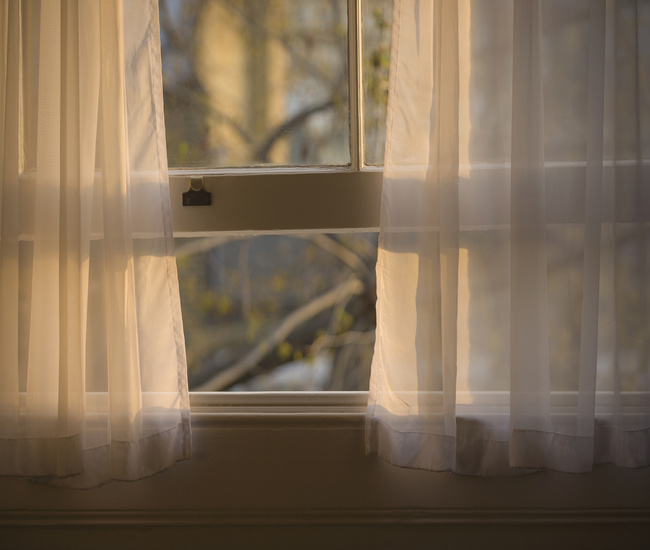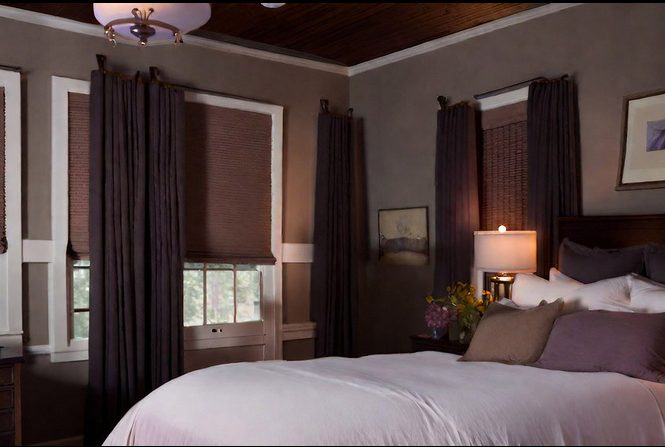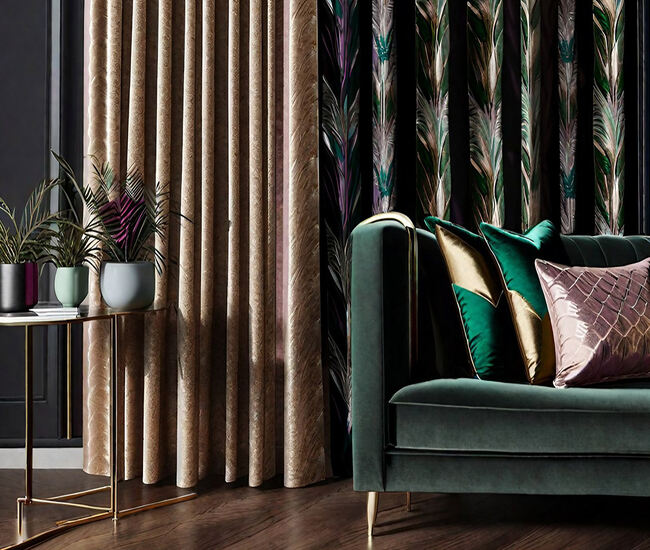Blinds and curtains are popular window treatments. And each type has its own pros and cons. So, the choice between blinds and curtains will depend on your functional requirements, interior décor style, and affordability. Here’s a comprehensive user guide on blinds vs curtains: which one is best for home.
Blinds vs Curtains

Blinds and curtains both serve the purpose of providing privacy, light control, and decorative touch to the interior of your room, but they differ in their designs, materials, and functionalities. Here are some of the main differences between window blinds and curtains:
- Design: Blinds are usually made up of individual (horizontal or vertical) slats or vanes that you can adjust to control the amount of light that enters a room. On the other hand, curtains are large pieces of fabric that are either opened or closed to provide privacy, light control, and energy efficiency.
- Materials: Blinds can be made from a variety of materials, such as wood, aluminum, vinyl, and fabric. On the other hand, curtains are typically made of heavier fabrics, such as cotton, polyester, or silk.
- Light Control: Blinds for windows and doors are more effective than curtains in terms of light control, as they allow you to adjust the angle of the horizontal or vertical slats to let in or block out light. In contrast, curtains are generally better at blocking out light completely when they are fully closed.

- Privacy: Both blinds and curtains provide privacy. However, blinds are generally more effective at this because they can be adjusted to allow in light while still maintaining privacy.
- Energy Efficiency: Certain types of window blinds can help improve energy efficiency by blocking out sunlight and reducing heat gain in the summer. On the other hand, some types of curtains can help insulate windows and reduce heat loss in the winter.
Overall, window blinds offer more flexibility in terms of privacy and light control, while curtains can provide a softer, more decorative touch to your room.
Things to Consider When Choosing Between Blinds and Curtains
The choice between window blinds and curtains largely depends on your personal preference, functional requirements, and the specific needs of your home’s interior décor style. Here are some factors to consider when making a choice between curtains and blinds for windows.
- Light Control: If you need precise control over the amount of light that enters your home, blinds are the best choice. You can adjust them to allow in a little or a lot of light. Curtains, on the other hand, can be easily opened or closed, but they may not provide you as much flexibility in terms of light control.
- Privacy: If you need to maintain privacy in your home, both window blinds and curtains can provide this. However, blinds can be adjusted to allow in sufficient light while still maintaining privacy, while curtains need to be fully closed to achieve the same level of privacy.
- Style: The style of your home’s interior décor may influence your choice between blinds and curtains for windows. Curtains come in a wide range of fabric choices and styles, so you can find one that matches the interior décor of your home. On the other hand, blinds also come in different materials and styles, but they may have a more modern or minimalist look.
- Energy Efficiency: If you want to reduce energy costs and keep your home cool in summer and warm in winter, both blinds and curtains can help. Insulating curtains can provide an extra layer of insulation to your windows, whereas some types of blinds can reflect sunlight and reduce heat gain.
Pros and Cons of Blinds
It is important to consider the advantages and disadvantages of window blinds before making a choice to buy them.
Here’re some pros and cons of blinds for windows.
Pros
- Light Control: Blinds for windows and doors are very effective in controlling the amount of light that enters a room. Their slats can be adjusted to let in or block out light as needed.
- Privacy: Blinds can provide an additional layer of privacy to your home’s windows by preventing people from looking in while still allowing you to see out.
- Style: Blinds come in several styles and materials, so you can choose the one that matches your home decor and personal style.
- Low Maintenance: Blinds are relatively easy and economical to clean and maintain. Depending on the material, they can be dusted, wiped down, vacuumed, or even washed with water.

- Durability: Certain types of blinds for windows, such as those made of aluminum or vinyl, are very durable and can last for years.
Cons
- Cost: Blinds for home can be more expensive than curtains, especially if you opt for high-quality materials or other custom options.

- Installation: Installing blinds in your home can be more difficult than curtains, especially if you have multiple windows or need to customize the size or shape of the blinds.
Pros and Cons of Curtains
Pros
- Style: Curtains are available in a wide variety of colors, designs, patterns, and fabric choices. So, you can easily find a style that matches your home’s interior decor and your personal taste.
- Insulation: Heavy, lined curtains for homes can provide additional insulation to your windows, helping to keep your home warm in winter and cool in summer.

- Cost: Curtains are generally less expensive than blinds, especially if you opt for ready-made styles.
- Easy to Install: Hanging curtains on windows is a simple process that can be done without any professional help.

- Light Control: Curtains for homes can be easily opened or closed to control the amount of light that enters your room.
Cons
- Maintenance: Curtains can be more difficult to clean than blinds, especially if they are made of delicate or intricate fabrics.
- Limited privacy: Depending on the type of curtains you choose for your home, they may not provide as much privacy as blinds, especially if they are lightweight or sheer.
- Durability: Some types of curtains for homes may not be as durable as blinds, and they may need to be replaced more frequently.
- Space Requirements: Curtains can take up more space in your home than window blinds, especially if they are designed to be drawn to the sides of the window.
Bottom Line
While window shades and curtains are good window treatments, both may not be suitable for all types of situations and settings.
